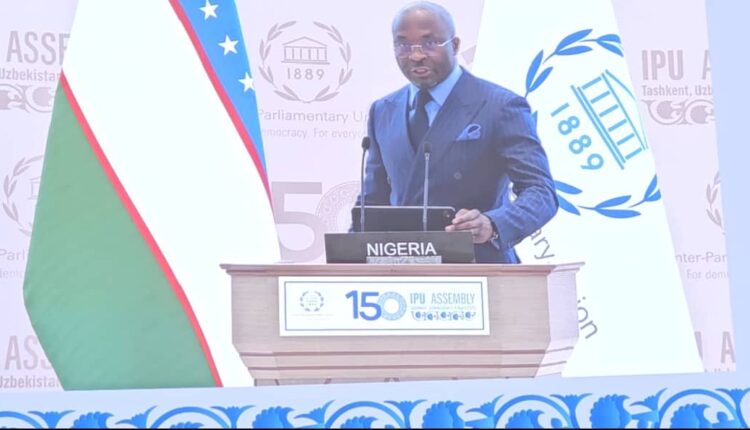Deputy Speaker of Nigeria’s House of Representatives, Rt. Hon. Benjamin Okezie Kalu has called on countries of the world to pioritize the development and implementation of robust frameworks for post-war recovery.
He said that the approach is not only a moral imperative but also a strategic necessity to secure lasting peace and stability in regions scarred by conflict.
Kalu also said that it’s only when this objective is achieved that the world can hope to transform the lessons of the past into a resilient foundation for a peaceful future.
The Deputy Speaker made the call in a proposal titled “The Imperative for Strengthened Post-War Management” which he submitted at the ongoing 150th General Assembly of the Inter-Parliamentary Union (IPU) at Tashkent, Uzbekistan.
The Deputy Speaker who was named a co-rapporteur to the IPU’s Standing Committee on Peace and International Security to speak on “The role of parliaments in establishing robust post-conflict management mechanisms and restoring a just and lasting peace” alongside A. Al-Zu’bi of Jordan and Ms. F. Belhirch of Netherlands noted the devastating effects of conflicts and wars in Sudan and Democratic Republic of Congo (DRC).
He said “Despite multiple peace agreements, sporadic violence persists due to inadequate post-conflict reconstruction and weak governance structures.
“The failure to establish a resilient peacekeeping and reconstruction framework has left Sudan vulnerable to renewed conflict. Economic marginalization and weak institutions have further impeded sustainable peace, demonstrating the need for stronger mechanisms in post-war
management.

“The DRC has been plagued by conflict since the 1990s, including the First and Second Congo Wars, which have been termed “Africa’s World War” due to their scale and the involvement of multiple neighboring countries.
The wars have resulted in over 5 million deaths, primarily due to disease, starvation, and violence. The region continues to experience sporadic conflict, undermining decades of fragile peace efforts.
“Weak post-war governance, pervasive corruption, and insufficient integration of conflict resolution strategies have prevented lasting stability.
“The international community’s inability to enforce comprehensive peace agreements has contributed to an environment where recurring violence is the norm.
“The historical trajectory from World War I to regional conflicts in Sudan and
the DRC reveals a persistent pattern: the failure to establish strong post-war management mechanisms results in recurring cycles of violence and instability. To break this cycle, the international community, in collaboration with national governments, must prioritize the development and implementation of robust frameworks for post-war recovery.”
Kalu who is also the convener of the Peace In South East Project (PISE-P), aimed to restore peace in the South Eastern part of Nigeria through non kinetic means further stated that the experiences of both Sudan, the DRC and indeed, other war-torn places in the world demonstrated that victory in conflict is only the first step in peace initiatives.
To achieve sustainable peace, Kalu therefore demanded institutional strengthening, economic reconstruction, soial reconciliation, integration as a healing mechanism and international support.
“Develop resilient governance structures capable of managing conflict aftermath and fostering inclusive political processes; implement comprehensive economic recovery plans that prioritize rebuilding infrastructure, creating jobs, and reducing inequalities; facilitate dialogue among warring factions and communities to heal historical grievances and promote national unity; establish systems that incorporate previously vanquished groups into the political architecture. By creating policies that guarantee their participation in government, societies can mitigate ill-feelings and engender national unity. Such integration not only honors principles of justice but also transforms former grievances into opportunities for inclusive governance and leverage global institutions to provide ongoing support, monitoring, and accountability to ensure that peace agreements are fully implemented”, Kalu said.

